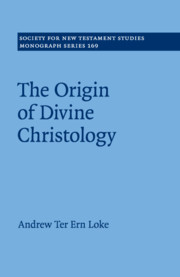
-
Select format
-
- Publisher:
- Cambridge University Press
- Publication date:
- July 2017
- July 2017
- ISBN:
- 9781108185486
- 9781107199262
- 9781316648759
- Dimensions:
- (216 x 138 mm)
- Weight & Pages:
- 0.45kg, 262 Pages
- Dimensions:
- (216 x 140 mm)
- Weight & Pages:
- 0.42kg, 266 Pages
- Series:
- Society for New Testament Studies Monograph Series (169)
You may already have access via personal or institutional login- Series:
- Society for New Testament Studies Monograph Series (169)
Book description
In recent years, there has been considerable debate concerning the origin of divine Christology. Nevertheless, the proposed theories are beset with problems, such as failing to address the evidence of widespread agreement among the earliest Christians concerning divine Christology, and the issues related to whether Jesus' intention was falsified. This book offers a new contribution by addressing these issues using transdisciplinary tools. It proposes that the earliest Christians regarded Jesus as divine because a sizeable group of them perceived that Jesus claimed and showed himself to be divine, and thought that God vindicated this claim by raising Jesus from the dead. It also provides a comprehensive critique of alternative proposals, and synthesizes their strengths. It defends the appropriateness and merits of utilizing philosophical distinctions (e.g. between ontology and function) and Trinitarian concepts for explaining early Christology, and incorporates comparative religion by examining cases of deification in other contexts.
Reviews
‘This fresh attempt to grapple with the problem of the origins of Christology both offers what is in some ways an elegantly simple solution, and is argued with a philosophical sophistication uncommon in New Testament scholarship. Loke's argument deserves close attention from all those interested in the earliest Christian beliefs about Jesus.’
Simon Gathercole - University of Cambridge
‘The debate over Jesus and the origin of views about his divinity in Christology is a maze for most, woven over a few centuries of careful discussion. Loke’s The Origin of Divine Christology surveys and assesses that debate with skill, bringing it up to date and providing guidance for thinking through the question. It provides a way through the maze that is of rich benefit to readers.’
Darrell L. Bock - Dallas Theological Seminary
‘Andrew Ter Ern Loke draws on the lively debate about early Christology in recent scholarship to establish the claim that the earliest Christology was already the highest Christology. But how did this high Christology originate? Loke provides one of the most systematic examinations of this question, pressing the logic of the evidence back to Jesus' own claims about himself.’
Richard Bauckham - Emeritus Professor of New Testament Studies, University of St Andrews, Scotland
“[Loke] defends his position against every recent dissenting argument he could find, especially in Bart Ehrman’s numerous works, with a philosophical rigor and elegant simplicity not present in those with whom he dialogues nor typically found in New Testament scholarship more generally … Loke’s work merits a wide readership. Those who still cling to an older religionsgeschichtliche Schule approach to the slow evolution of New Testament Christology may find they have a difficult task if they want to adequately counter this newer emphasis on its revolutionary development.'
Craig L. Blomberg Source: Review of Biblical Literature
'Loke’s book is valuable both as an exposition of the thesis that earliest high Christology ultimately derives from Jesus’ own claims, as well as a survey of, and critical introduction to, key works in this expanding field. While Loke’s many arguments in favor of a widespread and virtually uncontested high Christology might give the impression that his conclusions have been decided in advance, an impression is nonetheless not a rebuttal, and each of his claims should be assessed on their own terms. This book will be of particular interest to both biblical scholars and theologians working in Christology, theology proper, and Pauline, Synoptic, and Johannine theology. It will also serve as a reasonably accessible introduction for undergraduates seeking an overview of debates surrounding early Christian Christology.'
Cameron Coombe Source: Reviews in Religion and Theology
'I want to thank Andrew Ter Ern Loke for his carefully-researched, well-argued, and properly-nuanced contribution to the dialogue concerning the nature of the earliest Christian views about Jesus …'
Nina Henrichs-Tarasenkova Source: Journal of the Evangelical Theological Society
‘I found The Origin of Divine Christology to be exemplary in bringing the reader up-to-date with the most recent evidence and objections in a systematic way. This is one of best contemporary treatments for professors and teachers to consult and study at length for the purposes of showing the reasonableness of belief in Jesus’ divinity.’
Glenn Sinischalchi Source: The Catholic Biblical Quarterly, pp. 502–503
Contents
Metrics
Altmetric attention score
Full text views
Full text views help Loading metrics...
Loading metrics...
* Views captured on Cambridge Core between #date#. This data will be updated every 24 hours.
Usage data cannot currently be displayed.
Accessibility standard: Unknown
Why this information is here
This section outlines the accessibility features of this content - including support for screen readers, full keyboard navigation and high-contrast display options. This may not be relevant for you.
Accessibility Information
Accessibility compliance for the PDF of this book is currently unknown and may be updated in the future.


